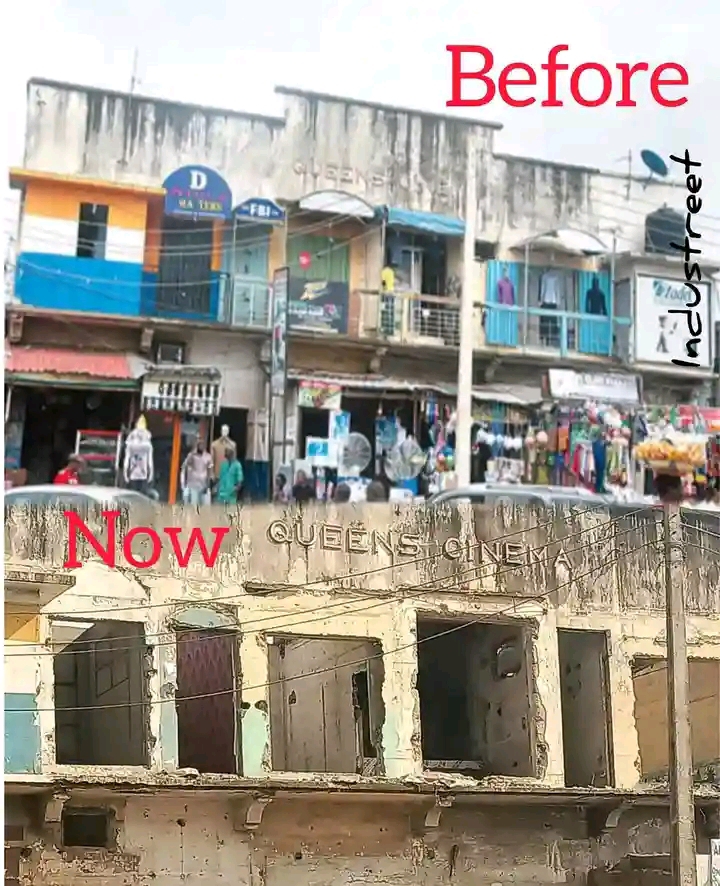

#ibadan
paul olaniran@olaniranpaul591203
1 year ago
Unspooling Memories of Queen Cinema in Ibadan
The word " Queen Cinema" to those who has no idea of it in the city of Ibadan means road.
"Unspooling" is a great word to use in the context of Queen Cinema's history.
As the reels of time unspool, memories of Queen Cinema's glorious past come flooding back. For generations of Ibadan residents, the cinema was more than just a place to watch movies, it was a cultural institution, a community hub, and a symbol of the city's rich heritage.
In this historical piece, I 'll delve into the fascinating history of Queen Cinema, exploring its rise to fame, its impact on Nigerian cinema, and its enduring legacy in the hearts of Ibadan's people.
In the heart of Ibadan, stood a cultural icon that brought joy, excitement, and entertainment to generations of film enthusiasts. Queen Cinema, a beloved landmark in the city's Dugbe area, was more than just a movie theater, it was a hub of social activity, a symbol of community pride, and a testament to the power of cinema to bring people together.
"The Queen's Cinema, a historic landmark in Dugbe, Ibadan, is undergoing structural reconstruction bringing an end to a legacy that spanned generations. This cinema was a trailblazer in Nigerian entertainment, introducing children to the magic of movies"
Nigerian cinema has come a long way, from humble beginnings to becoming a powerhouse in the global film industry. Let's take a walk down memory lane and explore the fascinating history of Nigerian cinema.
The cinema's heyday was marked by a sense of excitement and anticipation. Moviegoers would flock to Queen Cinema, eager to experience the magic of the silver screen. The cinema's ornate decorations, comfortable seating, and state-of-the-art sound system made it the perfect venue for a night out with family and friends.
During this Colonial period, 1920s- 1950s, mobile cinemas were the only means of movie exhibition. The earliest feature film made in Nigeria was "Palaver" (1926), produced by Geoffrey Barkas. Other notable films produced in this era were "Sander of the River" (1935), "The Man from Morocco" (1945), and "Men of Two Worlds" (1946).
During Golden age era, 1950s - 1980s marked the rapid expansion of the cinema business in Nigeria. Indian, Chinese, American, and Japanese movies flooded the market, and Nigerian movies, producers, and actors began to gain relevance. Theatre and movie practitioners like Moses Olaiya Adejumo, Jab Adu, Ladi Ladebo, Hubert Ogunde, Sadiq Balewa, and Isola Ogunsola became household names.
The home video era, 1980s-2010s, revolutionized the Nigerian film industry, launching what would become known as Nollywood. "Evil Encounter" (1980) was the first film released directly for a television audience, while "Living in Bondage" (1992) marked the dawn of the home video era. By the early 2000s, Nigeria was producing at least five movies every day!
In recent years, 2010 till date, Nigerian cinema has experienced a resurgence, with the emergence of new cinemas and filmmakers. The industry has become more sophisticated, with better production quality, storytelling, and marketing. Movies like "The Wedding Party" (2016), "New Money" (2018), and "King of Boys" (2018) have become box office hits, both locally and internationally.
Dugbe community owes its name to the legendary Queen's Cinema, a beloved hub for children's entertainment. This pioneering cinema, which once used projectors to captivate audiences, has given way to a new real estate project, marking the end of an era.
The iconic Queen's Cinema in Dugbe, Ibadan, left an indelible mark on the community, lending its name to the entire neighborhood. Sadly, this historic landmark was is being demolished and reconstructed since the month of November 2024 to make way for a new real estate development.
Queen Cinema was more than just a movie theater, it was a cultural institution that played a significant role in shaping Ibadan's community. The cinema hosted numerous film premieres, cultural events, and social gatherings, cementing its status as a beloved landmark.
For many Ibadan residents, Queen Cinema was a place of fond memories, where they spent countless hours watching movies, laughing with friends, and making new ones. The cinema's nostalgic charm continues to evoke strong emotions, with many reminiscing about the good old days when Queen Cinema was the epicenter of entertainment in Ibadan.
For many residents of Dugbe, Queen's Cinema was more than just a movie theater – it was a hub for social activity, a place where memories were made, and a source of community pride. Its reconstruction will be deeply felt.
Ibadan's transformation into a cultural powerhouse was fueled by the presence of the University of Ibadan, which became a hub for creative expression and intellectual discourse. The university's campus resonated with the voices of iconic writers, artists, and thinkers, shaping the country's cultural identity.
The University of Ibadan's impact on Nigeria's cultural development cannot be overstated. As the country's first university, it drew a diverse array of artistic talent, including Ken Saro-Wiwa, Demas Nwoko, and Mabel Segun, who helped establish Ibadan as a beacon of creative excellence.
Although Queen Cinema is no longer in operation, its legacy lives on. The cinema's impact on Nigerian cinema cannot be overstated, having played a significant role in promoting the country's film industry. Many Nigerian filmmakers, including the legendary Hubert Ogunde, got their start at Queen Cinema, showcasing their films to eager audiences.
Today, as Ibadan continues to evolve and grow, the memory of Queen Cinema remains an important part of the city's cultural heritage. Efforts to preserve the cinema's legacy, including the establishment of a film archive and museum, are underway, ensuring that the magic of Queen Cinema will continue to inspire future generations of film enthusiasts.
Queen Cinema may be gone, but its impact on Ibadan's cultural landscape will never be forgotten. As we look back on the cinema's rich history, we are reminded of the power of cinema to bring people together, to inspire, and to entertain. Queen Cinema may have been just a movie theater to some, but to many, it was so much more a cultural icon, a community hub, and a symbol of the enduring magic of the silver screen.
#ibadan #ibadanhistory #dugbe #ibadanhistoricalpath #NigerianCinema #Nollywood #MovieHistory #CinemaRevival #FilmIndustry #Entertainment
Basòrun Onítàn Ìbàdàn is a socio - philosopher, author, reformer, coach and public policy expert, a seasoned academia who loves to write about social related and contemporary issues.
